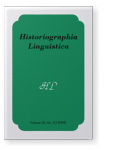Vol. 20:2/3 (1993) ► pp.341–454
On generativity
The history of a notion that never was
Chomsky insists that he has always understood a generative grammar to be “nothing more than an explicit grammar”. Other commentators have understood that ‘generate’ means ‘specify an infinite set’ and that a ‘generative’ grammar is a grammar which specifies an infinite set of sentences. This understanding of the term ‘generative’ has had a long and interesting history within the confines of linguistic theory starting in the writings of Chomsky’s intellectual predecessors and continuing through the writings of Chomsky himself. In some cases, it even seems that ‘to generate’ is a near synonym for ‘to produce’ both in the writings of Chomsky and of other early transformationalists. In other instances, it is difficult to see how ‘explicit’, an adjective, can serve as a synonym for ‘generate’, a verb as this verb has been used throughout the history of transformational generative linguistics. Furthermore, it would appear that a rule like move-α has little or no meaning in a non-generative grammar, i.e., one that is merely ‘explicit’, one that does not rely on process type statements as its modus operandi. Nevertheless, in the recent history of transformationalism, Chomsky insists that ‘generative’ means nothing more than ‘explicit’ and nothing less. To him, the notion that ‘generative’ has something to do with specifying or characterizing a set of sentences is a notion that never was.
